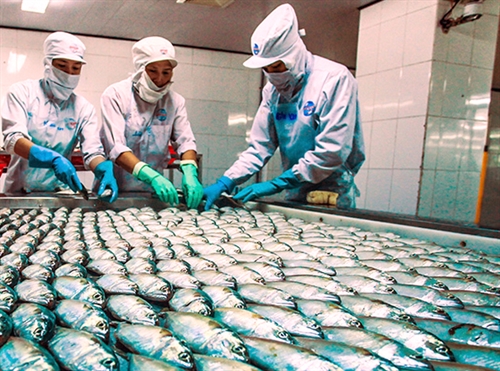 Economy
Economy

Việt Nam is aiming to become one of the world's top five seafood processing countries.

|
| Fish are processed at Ngô Quyền Processing Export Company in Châu Thành District, Kiên Giang Province. The Trans-Pacific Partnership is expected to bring large opportunities for many industries to expand exports. — VNA/VNS Photo Trọng Đạt |
HÀ NỘI — Việt Nam is aiming to become one of the world's top five seafood processing countries.
The Prime Minister recently issued Decision 1408/QĐ-TTg approving the development of the seafood processing industry over the next 10 years.
The plan aims to develop a modern, efficient and sustainable seafood processing industry, meeting the needs and regulations of the consumption market; improve competitiveness and continue to integrate deeply into the global value chain.
The target is for the growth rate of processed seafood production to reach more than six per cent per year by 2030.
The proportion of export value of value-added processed seafood products reached an average of over 40 per cent, in which shrimp reached 60 per cent, pangasius 10 per cent, tuna 70 per cent, squid and octopus 30 per cent, and other aquatic products 30 per cent.
The scheme aims to form a number of modern seafood processing corporations and enterprises, with economic potential and management level at a world-class standard.
The value of seafood processing for domestic consumption is expect to hit VNĐ40 - 45 trillion (US$1.7 – 1.9 billion), contributing to the value of seafood export turnover of about $14-16 billion.
To achieve the objectives, the plan sets out necessary tasks such as organising the control and development of raw materials for aquatic product processing from farming, exploitation and importation to meet the needs of processing enterprises and suitable for domestic consumption and export demand; comply with the conditions and regulations of Việt Nam and international practices; ensure the requirements of traceability, avoid origin fraud, and trade fraud.
It also set a goal to attract investment to form large seafood processing corporations and companies with economic potential and world-class management; step up the processing of products with high added value, which focus on key product groups and develop seafood consumption market.
The scheme has six projects, priority tasks for implementation with a total cost of VNĐ420 billion. — VNS




